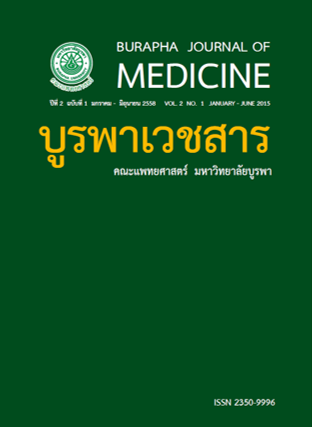The Effects of Neuro-Linguistic Programming Counseling on Anti-retroviral Adherence of People Living with HIV/AIDS (PLWHA)
Keywords:
Neuro-Linguistic Programming, Counseling, People Living with HIV/AIDS (PLWHA), Antiretroviral drugAbstract
HIV/AIDS has become a lifelong treatment with the advancement of anti-retrovirus therapy (ART). The purpose of this study was to study the effect of Neuro-Linguistic Programming (NLP) counseling program on PLWHA who were receiving ART. The sample consisted of 64 PLWHA who were receiving ART for at least one year, whose physician had diagnosed them as having poor ART adherence and receiving a score of ≤ 90% on Wantana’s self-report adherence evaluation sheet 2004. The group was divided into two groups of 32 people by a process of simple random sampling. The experimental group received general advice and the NLP counseling program, while the control group received the general advice from the servicing clinic. The research design was a pretest-posttest experimental group design, including follow-up testing after 2 months. The data were statistically analyzed by utilizing a repeated measures analysis of variance. The results revealed that the interaction between the methods and the duration of the experiment was found to be significant (p < .01). The PLWHA who received the NLP counseling demonstrated significantly higher ART adherence than the control group in both the posttest and follow-up phases (p < .01). The PLWHA in the experimental group had significantly higher adherence in the posttest and follow-up phases than the pretest phase (p < .01). Thereafter the NLP counseling could be used for the health service clinic which saved time and effectiveness, are needed.
References
BJ. Antiretroviral adherence interventions:
a review of current literature and ongoing
studies. Review-Antiretroviral Adherence
Interventions. 2003. 11; 185-98.
2. AIDS Division, Ministry of Public Health,
Thailand. HIV Situation in Thailand. [cited
2006 Oct 5]. Available from: http://www.
aidsthai.org/arrv03.html.
3. UNAIDS. Report on the global AIDS epidemic:
Executive summer/UNAIDS. A UNAIDS 10th
anniversary special edition: Geneva; 2003.
4. National Health Security Office. NHSO
Annual report 2008. Bangkok: T. Film
Co.,Ltd.; 2009.
5. Chasombat S, Lertpiriyasuwat C, Yooktanon
P. Guideline practices for national access to
care program for HIV/AIDS. 2nd ed. Bangkok:
R.S.P. press; 2003.
6. Johns Hopkins University. Adherence to
antiretroviral therapy among substance users.
2005. [cited 2006 October 4]. Available from:
http://www.hivguidelines.org/GuideLine.
aspx? pageID=262&guideLineID=49
7. Levy RW, Rayner CR, Fairley CK, Kong
DCM, Mijch A, Costello K, McArthur C, and
Melbourne Adherence Group. AIDS Patient
Care and STDs. December 2004, 18: 728-35.
doi:10.1089/apc.2004.18.728.
8. O’ Connor J, Seymour J. Introducing Neuro-
Linguistic Programming: Psychological skills
for understanding and influencing people.
2nd ed. SanFrancisco, CA: Aquarian; 1993.
9. Villar IG. The Unconscious Mind: Our
creative consultant. Philippines: Peimon
Press; 1997.
10. Maneesriwongkul, W. & Williams. A.
Self-report adherence to antiretroviral
medications among patients with HIV in
Thailand: Validation of visual analog scale
on virological treatment outcomes. Under
review; 2004.
11. Howell DC, Fundamental statistics for the
Behavioral Sciences. 4th ed. Pacific Grove,
CA: Brook/Cole; 1999.



